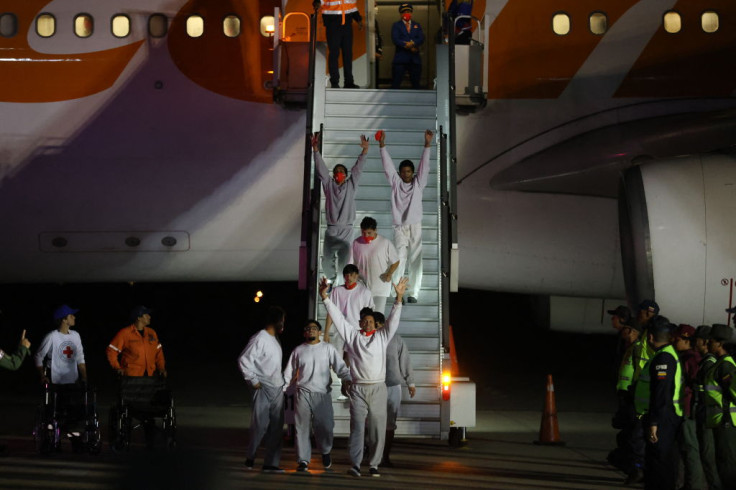
Over 170 undocumented migrants who were jailed at Guantanamo Bay were deported from the U.S. back to Venezuela last week. As authoritarian President Nicolas Maduro celebrated the return of citizens, some of the men have recounted their ordeal at the infamous naval base.
The Washington Post spoke with three of the Venezuelan detainees who spent 14 days at Guantanamo: Diuvar Uzcategui, Jose Daniel Simancas and Franyer Montes.
Uzcategui, 27, told the outlet he had no criminal history and was arrested at 2 a.m. in his home and taken to a tarmac, where he received little information as to where he was going. The Trump administration named him as a Tren de Aragua member, but himself, his family and friends all deny that accusation, saying he has never been even loosely connected to a gang and the only crime he committed was crossing the border unlawfully.
Once in Guantanamo, he couldn't tell when the days started and ended within the windowless, peeling yellow four walls of his cell. He kept track of the days by putting a small tear in the last, blank page of a Bible after every third meal. The book was given to him by the military guards along with a blanket and a 3.4-inch foam pad to sleep on.
During his stay at the detention camp, the man said he was rarely let outside. Both times he was let outside during his two-weeks there he was shackled and placed in what he described as a cage.
"They didn't treat me like a human being," he said, his voice flustered with indignation. "They threw me in a cage."
The three men said they were denied calls to lawyers or loved ones despite repeated pleas. They said they were subjected to humiliating and invasive strip searches and described prolonged periods in isolation, with only two one-hour opportunities to go outside over two weeks.
The description coincides with that of another migrant who also shared his story. Kevin Rodriguez, who recently spoke to Noticias Telemundo, said that the camp looked like it hadn't been inhabited in a "long time," with the migrants being greeted by cobwebs, ants and insects.
Rodriguez also explained that little food was provided to him and his fellow prisoners and that the last meal of the day was at 4 p.m., which led him to lose 14 pounds during his stay. Furthermore, he said that officers would only let them shower once every three days, handcuffed and undergoing thorough inspections before and after those showers.
The Trump administration said Guantanamo would be reserved for the "worst of the worst," but court filings reveal that not all those who were sent to the facility were considered to pose a "high threat," CNN reported. Of the Guantanamo deportees, 126 people had criminal charges or convictions— including 80 allegedly affiliated with the Venezuelan gang Tren de Aragua— a Department of Homeland Security spokesperson said. However, 51 had no criminal record.
Nevertheless, in prison, migrants with or without a criminal background were all treated the same. "They treated us all the same, we were discriminated against basically only for being Venezuelans," Rodriguez told Noticias Telemundo.
Those conditions took a serious toll on each detainees' mental health. Uzcategui said he wasn't able to see his fellow inmates, but from his cell he could hear them screaming and threatening to kill themselves.
Montes, 22, said he reached a point in his 13-day incarceration when he considered taking his own life, but thoughts of his mother and child held him back.
Simancas tried to kill himself during his 10-day stay at Guantanamo. He attempted to cut his wrists with plastic water bottles that he had tried to sharpen. But the edges didn't cut deep enough, he said. The migrants said they knew at least two other men who acknowledged attempting to kill themselves as well.
"One tried to hang himself with the sheet but he couldn't tie it to the table because it was too small," Simancas said. "Another swallowed 10 screws and they took him to the emergency room several times."
"We all thought about killing ourselves," he added.
The migrants' conditions in Guantanamo "were horrific, and are far more restrictive, more severe and more abusive than what we would see in a typical immigration detention facility in the United States," said Eunice Cho, a senior staff attorney at the ACLU National Prison Project. The American Civil Liberties Union is one of many organizations that sued the administration to allow legal access to the migrants.
© 2025 Latin Times. All rights reserved. Do not reproduce without permission.




